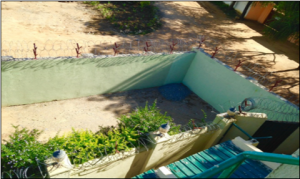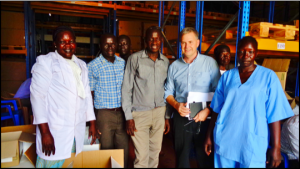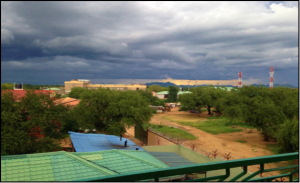
Since early 2016, after renewed fighting in South Sudan, Bill and I have been as-signed to eastern DRC on the Congo-Rwanda border to help meet needs from another crisis. We continue to support relief efforts in South Sudan, making trips into that war-torn country on a regular basis. We are filling our 3rd passport with visas and stamps as we transit through a number of countries on our travels back and forth by road and air.
What I notice on leaving South Sudan each time is how easy it is to forget what life is like there. The transition starts the moment you board the Kenya Airways flight on the steaming tarmac in Juba and sit in an air-conditioned cabin sipping cool water from a clear plastic cup and look through the window.
But this time, I don’t want to forget.
I want to imprint in my memory what life is like: the heat, the dust, the cattle herds, the pervasive insecurity and necessity of traveling in convoys, having to remain indoors after 6pm due to curfew, or what it’s like to sleep with a ‘panic button’ by the bed, and live and work behind double walls topped with razor wire.


I don’t want to forget…
But more than my own ‘fleeting inconveniences’, I want to remember and tell what life is like for those who cannot leave, who live here day after day, of the severe difficulties they face and the changes I notice with each visit … the in-creasing poverty, hunger, and insecurity. In 2011 at independence the people were proud and optimistic about their future; now their daily burden is to find sufficient food and water for their families. I notice the changes as I go out in the day. When you smile at people in the street, even children, you rarely get a smile in return.
As we worked with our South Sudanese staff to package four containers full of medicine last week, they shared stories. Two persons had their homes broken into that very week and were robbed at gunpoint by armed men. One of the men, Kenyi, comforted his wife after their home was pillaged and told her, “Let us stay safe… if they want to take some things… we can get more.” Another man, Taban laughed, adding, “That’s life in South Sudan. All the world is talking about climate change and we are talking about our security … before the war began, we slept well. Every night now, we are nervous.”

I remember 37 years ago when Bill and I were Peace Corps volunteers in the (then) peaceful West African county of Mali. A common Malian saying at the end of the day was ‘K’an kelen kelen wuli’, translated … ‘may you each wake up one by one’. The meaning is that if a family wakes up suddenly together, it’s because something has happened. However, if family members wake one by one, the night was spent in peace.

With all our hearts we pray for peace in South Sudan. May they once again know what it is like to wake up ‘one by one’.
And God shall wipe away all tears from their eyes; and there shall be no more death, neither sorrow, nor crying, neither shall there be any more pain: for the former things are passed away. Revelation 21:4